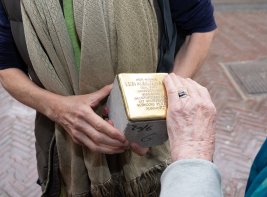This month the KB, National Library of the Netherlands, published its new strategy for the formation of the National Library collection. This plan responds to publishing’s changing culture and describes the criteria that lay the foundation for developing the National Library collection over the next six years.
A reflection of society
The KB is responsible for maintaining the National Library collection. This means that it aims to store one copy of everything published in or about the Netherlands, which traditionally included books, periodicals and newspapers.
The new strategy makes clear that the definition of a publication has now become much broader. In addition to traditional publications from publishing houses, people publish blogs, websites and posts on social media. Jasper Faase, head of collection development at the KB: 'We now collectively publish more words, thoughts and opinions online than we ever did in print. This broadening of the publishing culture means that we need to move with the times if our collection is to be truly representative of today's society. At the same time, this broadening also entails the KB making clearly defined choices in what we do and do not do.'
9 principles
The new collection strategy therefore consists of nine principles for the KB to use as a guide in shaping the collection and providing access to it. In addition to following the current publication culture more closely, reflection and representativeness take precedence over completeness. Faase: 'The broadening of our publishing culture means that it is no longer possible to save every form of a publication. We want to include publications that are characteristic of Dutch society, culture and knowledge today and are therefore also committed to broadening the collection's polyphony.'
In the past, the KB’s collection strategy focused primarily on creating an academic library. This led to popular genres such as comic books and thrillers being omitted, or collected to a lesser extent. Books by women and migrants were also considered less valuable. To fill these gaps, the KB is undertaking action to retrospectively elaborate the collection (collecting with retroactive effect). However, to facilitate the efficient use of resources, the KB coordinates the formation of its collection with other heritage institutions as much as possible. This is done to jointly take care of 'the national collection', identify gaps and avoid overlap.
Digital first
The KB maintains a digital first policy for the general collection, which means that a publication’s digital version is included instead of the paper edition whenever possible. Faase: 'We deliberately choose to collect more and more digitally, partly to make what is written online part of our collection profile. This helps more voices to be heard throughout to the National Library collection. We are also more often collecting books, newspapers and periodicals digitally to provide proper support to new forms of research.' The KB does not yet have a content stream to structurally include the digital versions of newspapers and periodicals. Steps will be taken in the coming years to achieve this.
Special collections
The KB continues to actively acquire physical publications for the special collections to ensure that unique, fragile or special publications are preserved for the future. Over the next six years, the KB will make a major effort to further digitalise its Special Collection, including the more than 1,400 medieval manuscripts held by the National Library.
The web archive
The KB's web archive aims to provide future generations a comprehensive picture of today’s Dutch digital culture. But it cannot completely archive the 10 million or so Dutch sites as some other National Libraries do. Current legislation and a lack of resources do not yet permit a so-called national domain crawl (a way of archiving all Dutch websites on the internet). Several other National Libraries are already conducting such a crawl. To also capture as much as possible of today's online culture in the Netherlands, the KB hopes that its appeal for an amendment to the law will be honoured in the coming policy period.
Websites and social media are sources for historical research Behandel ze dus als te beschermen erfgoed | de Volkskrant (So treat them as heritage to be protected | de Volkskrant)
Social media archiving
Wider archiving of social media posts is also an ambition of the KB. However, this presents a challenge due to the sheer amount and variability, along with practical and ethical hurdles. The selection criteria based on which the KB will archive social media posts during the coming policy period are also included in the new collection strategy.





